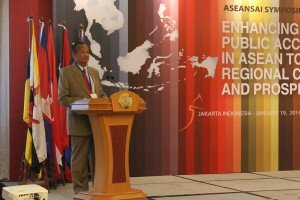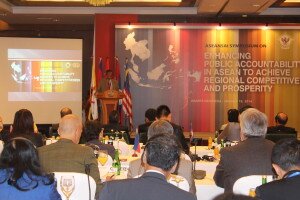GIZ Supports South-East Asian Countries for Enhancing Public Accountability of their Audit Institutions
19 January 2014
Jakarta, Indonesia. 19th January 2014. Seven ASEAN member states (Brunei Darussalam, Cambodia, Indonesia, Lao PDR, Malaysia, the Philippines and Vietnam) reached an agreement to implement measures for improving transparency and efficiency of their Supreme Audit Institutions in a meeting supported by GIZ.
The ASEAN member states participating in the symposium ‘Enhancing Public Accountability in ASEAN to achieve Regional Competitiveness and Prosperity’, organized in Jakarta (Indonesia), have decided to take crucial steps to overcome barriers for public auditing by 2017. These measures include: 1) To amend existing laws and regulations or to develop new regulations to strengthen the institutional and organizational capacities and autonomy of Supreme Audit Institutions; 2) To engage more actively with auditees and stakeholders such as the Public Accounts Committees, civil society, media and the public; 3) To increase awareness on public accountability amongst decision makers, politicians, etc.; and 4) To strengthen networking and sharing of good practices amongst ASEAN’s Audit Authorities.

Mr Tan Sri Dato’ Setia Ambrin Buang, Auditor General of Malaysia and Chairman of ASEANSAI Knowledge Sharing Committee of ASEANSAI
Tan Sri Dato’ Setia Ambrin Buang, Auditor General of Malaysia and Chairman of ASEAN Supreme Audit Institutions’s Knowledge Sharing Committee, presented a summary of results agreed by representatives from ASEAN member states during the meeting. The Malaysian Auditor General also highlighted a number of constraints for an effective public auditing system in the region: weak law enforcement; lack of coordination and cooperation between Supreme Audit Institutions and audited entities; limited parliamentary oversight; low transparency in public reporting; lack of mechanisms to ensure audited entities follow-up on Supreme Audit Institutions’ recommendations; and lackof qualified human resources, amongst others.Supreme Audit Institutions play a key role to promote good governance and monitor public finances. These institutions ensure that public finances are managed in compliance with state regulations in an efficient, accountable and transparent way. Supreme Audit Institutions also strengthen capacities of civil servants to ensure that their roles and responsibilities are clear as well as to facilitate their participation for monitoring governments’ public expenditures.
For more information, please visit the ASEAN Supreme Audit Institutions’ website: www.aseansai.org


